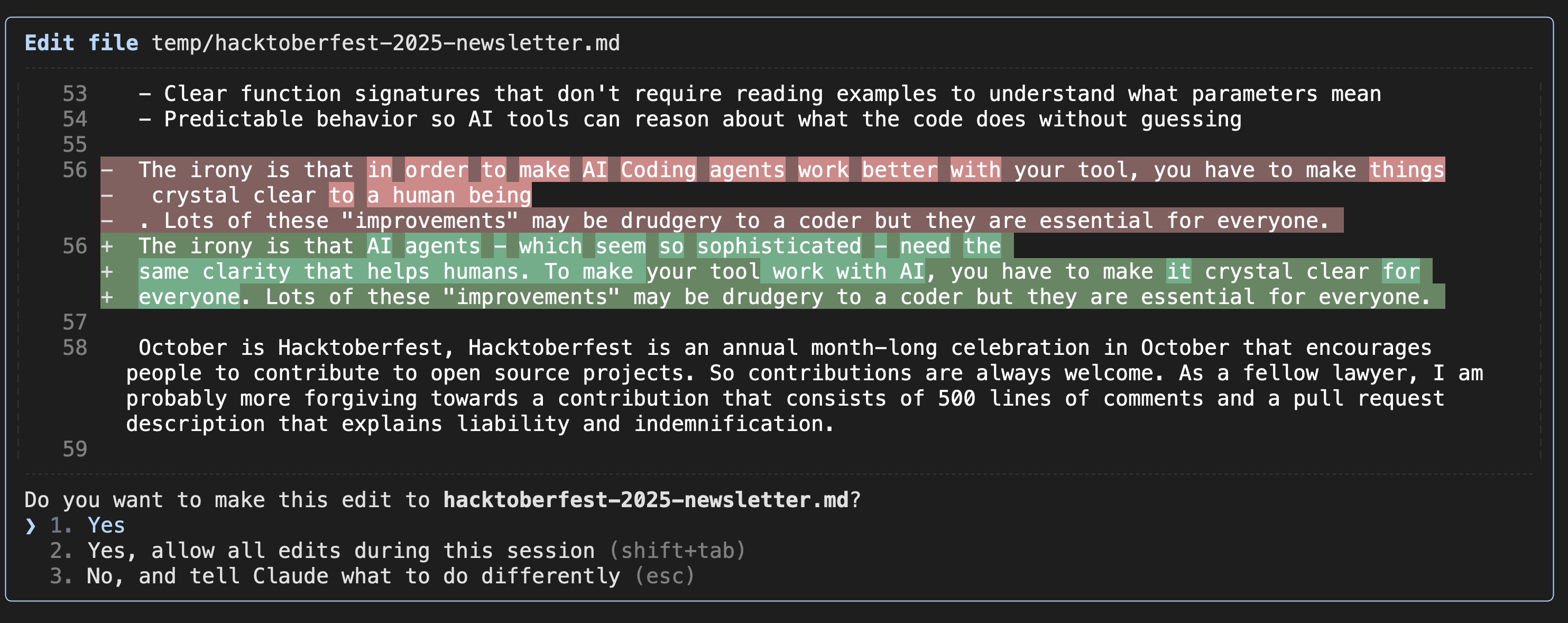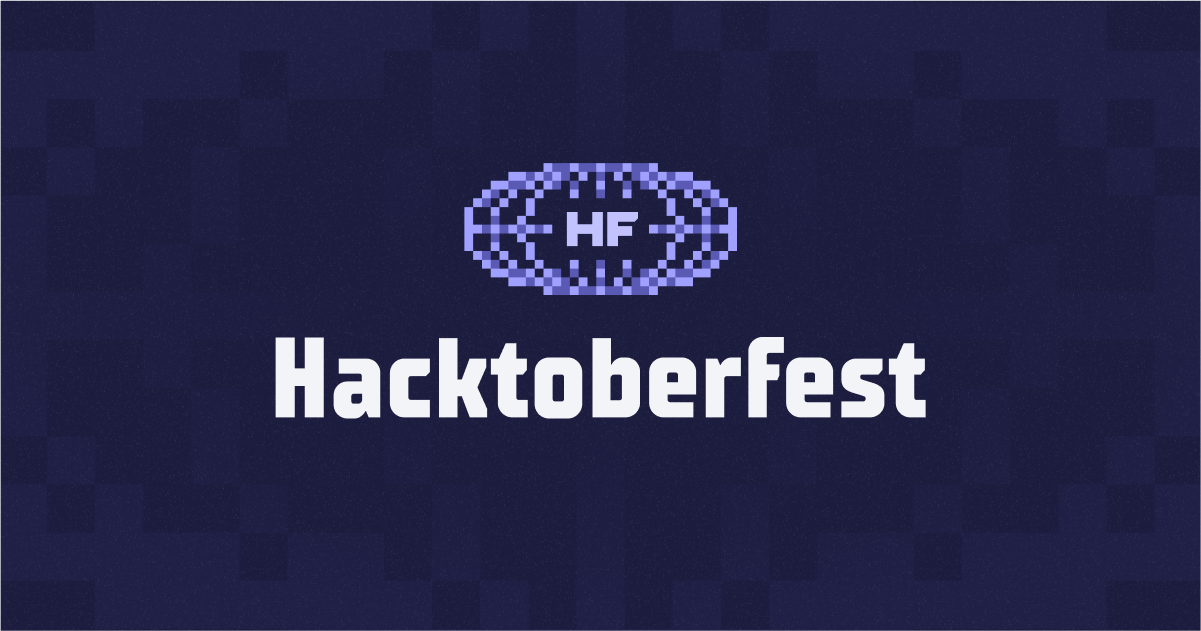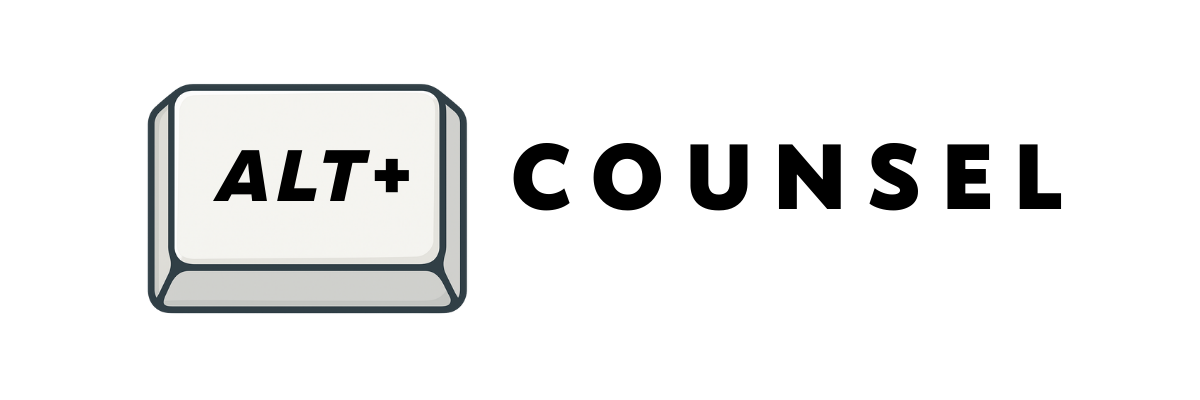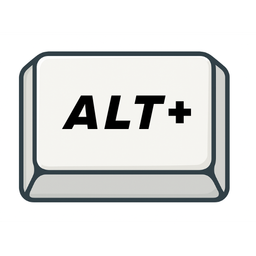Open Source, AI, and Why October Matters

Two years ago, I wrote about the unexpected joys of open source. My Python library, redlines, had gone briefly viral after being featured in a ChatGPT prompt engineering course. I was surprised anyone used it at all. I dealt with imposter syndrome. I learned to accept pull requests from strangers.
This Hacktoberfest, I'm not contributing code to other projects. I'm maintaining my own. And I'm learning that the AI tools that once featured my library now need my library to work better with them.
The irony isn't lost on me.
From Surprise to Intention
Back in 2023, I built redlines for a personal research project on legislative readability. Someone else finding it useful felt like a gift. It was something that happened to me rather than something I planned for.

Now, I'm actively adapting it for how people and AI actually work. Not just reacting to unexpected attention, but anticipating needs. The shift goes from "I hope this doesn't break" to "I'm making this work with AI coding agents."
That shift matters more than I expected.
Why I Still Maintain Open Source
Redlines does one thing: it compares text and shows you what changed. It was meant to do one simple thing and do it well. No lofty goals or 6 months to market schedules. It is freely available, so if you needed something to show a change in text, just use it.
People use it today for:
- Comparing contract drafts without uploading documents to third-party services.
- Viewing and marking changes in legislation (PLUS Explorer uses it for this).
- Quick text diffs in Jupyter Notebooks, Streamlit, or terminal environments.
- Getting Word-style track changes without Word.
It's open source too so not only is the tool itself freely available, the source code is also available. If for any reason I give up on the project, anyone else can take it up if they want. Redlines features the contributions of at least 7 contributors. It's used by hundreds of people in its 3 year lifespan from small hobbies, learning about AI and a small part of a big idea.
The honest truth: no one pays me to do this. When something breaks, it's on me. But alternatives need to exist. Every vendor that raises prices 40% annually, every tool that gets discontinued, every lawyer or developer priced out of "professional" solutions - they all validate why open source matters.
The New Challenge
This year brought a new dimension to maintaining redlines.
In the beginning, I targeted redlines to be used on as many coding platforms I could think of. I primarily used Streamlit, but I wanted Colab, Jupyter Notebooks, and even the command line as well.
This year, I started using Claude Code - an AI coding assistant - to help improve redlines. After seeing how effective it was for coding tasks, I experimented with using it for writing and content creation. That experiment became alt + counsel.
But here's the problem: when Claude Code encounters text differences in my blog drafts, it shows git-style diffs. Line-by-line changes work fine for code, but they're terrible for prose. They completely miss the nuances in wording that redlines was designed to capture.

This matters beyond just my blog. If you're a lawyer experimenting with AI to draft policies, analyze contracts, or automate routine work, you're likely to encounter these same compatibility issues. Tools that work well with AI will become more useful; tools that don't will fade into irrelevance.
And here's what I've noticed: software engineers have been far more successful at integrating AI into their workflows. One key reason? They built tools - many of them open source - that take advantage of AI from the ground up.
These tools are available to almost every coder in the world, which creates a network effect. By building redlines to work better with AI agents, I hope to encourage lawyers to build similar workflows and tools. We need our own ecosystem of AI-compatible legal tech, not just whatever vendors decide to sell us.
What I'm Working On
This October 2025, I'm working on : making redlines work better with AI coding agents.
Here's what that actually looks like:
- Instead of "Error occurred," redlines will say "File format mismatch: expected .txt, received .pdf".
- Clear function signatures that don't require reading examples to understand what parameters mean.
- Predictable behavior so AI tools can reason about what the code does without guessing.
The irony is that AI agents - which seem so sophisticated - need the same clarity that helps humans. To make your tool work with AI, you have to make it crystal clear for everyone. Lots of these "improvements" may be drudgery to a coder but they are essential for everyone.
October is Hacktoberfest, Hacktoberfest is an annual month-long celebration in October that encourages people to contribute to open source projects. So contributions are always welcome. As a fellow lawyer, I am probably more forgiving towards a contribution that consists of 500 lines of comments and a pull request description that explains liability and indemnification.

Why This Matters
Open source tools need to adapt to how people actually work now. That includes working with AI. When AI tools can't work with your library, users drift toward closed alternatives that do. Not because the closed tools are better, but because they're compatible with their workflow.
The tools you depend on need to keep up. When vendors lag or discontinue features you need, having open alternatives gives you options. It's not ideology - it's insurance.
As AI becomes part of how we work, we need open alternatives more than ever. Not as a political statement, but as practical protection against lock-in, price increases, and the consolidation of essential tools behind paywalls.
Looking Forward
From unexpected attention in 2023 to intentional adaptation in 2025 - that's the journey redlines has taken. This October, I'm making redlines work with the AI tools that once featured it in their courses.
If you care about having alternatives to expensive tools or you're thinking about how AI is changing legal work, I'd like to hear from you. What tools do you depend on? Which ones are adapting, and which ones aren't? Where do you need alternatives that don't exist yet?
The conversation matters as much as the code.








Member discussion